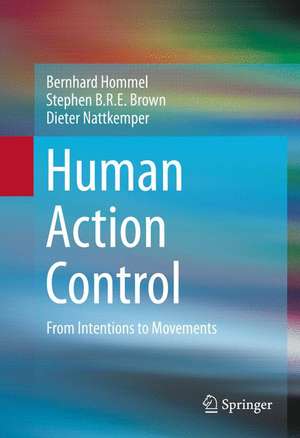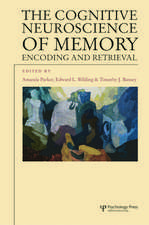Human Action Control: From Intentions to Movements
Autor Bernhard Hommel, Stephen B.R.E. Brown, Dieter Nattkemperen Limba Engleză Hardback – 11 apr 2016
This textbook provides a comprehensive introduction into the areas of human action planning and action control. It discusses the basic theoretical issues and questions in understanding the planning and control of human goal-directed action. The authors begin by presenting an integrative theoretical framework and the neurobiological foundations of action planning and execution. Subsequent chapters discuss how goals are represented and how they guide action control; how perception and action interact; how simple and complex actions are selected and planned; how multitasking works; and how actions are monitored. Topics of interest include: stimulus-triggered selections, rule-based selections, intentional action selections, and intuitive decision-making.
Human Action Control is a must-have resource for advanced undergraduates, graduates, and doctorate students in cognitive psychology and related areas, such as the cognitive neurosciences, and developmental and social psychology.
| Toate formatele și edițiile | Preț | Express |
|---|---|---|
| Paperback (1) | 524.36 lei 6-8 săpt. | |
| Springer International Publishing – 19 apr 2018 | 524.36 lei 6-8 săpt. | |
| Hardback (1) | 699.93 lei 6-8 săpt. | |
| Springer International Publishing – 11 apr 2016 | 699.93 lei 6-8 săpt. |
Preț: 699.93 lei
Preț vechi: 823.44 lei
-15% Nou
Puncte Express: 1050
Preț estimativ în valută:
133.93€ • 139.85$ • 110.59£
133.93€ • 139.85$ • 110.59£
Carte tipărită la comandă
Livrare economică 16-30 aprilie
Preluare comenzi: 021 569.72.76
Specificații
ISBN-13: 9783319092430
ISBN-10: 331909243X
Pagini: 250
Ilustrații: XII, 220 p. 60 illus., 14 illus. in color.
Dimensiuni: 155 x 235 x 14 mm
Greutate: 0.5 kg
Ediția:1st ed. 2016
Editura: Springer International Publishing
Colecția Springer
Locul publicării:Cham, Switzerland
ISBN-10: 331909243X
Pagini: 250
Ilustrații: XII, 220 p. 60 illus., 14 illus. in color.
Dimensiuni: 155 x 235 x 14 mm
Greutate: 0.5 kg
Ediția:1st ed. 2016
Editura: Springer International Publishing
Colecția Springer
Locul publicării:Cham, Switzerland
Public țintă
ResearchCuprins
Chapter 1. Introduction and Overview.- Chapter 2. Neurobiological Foundations of Action Planning and Execution.- Chapter 3. Intentions and Action Goals.- Chapter 4. Perception and Action.- Chapter 5. Action Selection.- Chapter 6. Action Planning.- Chapter 7. Sequential-Action Planning.- Chapter 8. Controlling and Coordinating Multiple Actions.- Chapter 9. Action Monitoring.
Notă biografică
Dr. Bernhard Hommel holds the chair of “General Psychology” at Leiden University since 1999, after having worked as senior researcher at the Max-Planck Institute for Psychological Research (PhD at the University of Bielefeld in 1990; Habilitation at the Ludwig-Maximilians University of Munich). He is a co-founder and board member of the Leiden Institute for Brain & Cognition (LIBC), secretary of the International Association for Attention and Performance, and member of the German National Academy of Sciences. His research focuses on cognitive, computational, developmental, neural, and neurochemical mechanisms of human attention and action control, and the role of consciousness therein. Recent work also addresses the role of emotion, creativity, and religion in human cognition. He is chief editor of two journals and has (co-) authored more than 300 articles in international journals and more than 60 chapters in readers and psychological textbooks, (co-)edited three bookson action control and the relationship between perception and action, and (co-)edited several special issues on attention and action control.
Dr. Stephen B.R.E. Brown studied developmental and cognitive psychology at the University of Amsterdam. After obtaining his Master’s degree there, he moved to Leiden University to obtain a Ph.D. under supervision of Professors Sander Nieuwenhuis and Bernhard Hommel. His dissertation focused on the locus coeruleus, a brainstem nucleus that provides the entire brain with the neuromodulator noradrenaline, which is released whenever we experience arousal. Currently, Dr. Brown works as a postdoctoral researcher at Leiden University, and studies heart rate variability as a predictor of psychosocial stress in collaboration with Professor Jos Brosschot. He is also employed as an instructor at the University of Amsterdam, where he coordinates and teaches a course on Cognition for interdisciplinary students.
<Dr. Dieter Nattkemper studied psychology at the University of Münster. His professional career started at the University of Osnabrück where he was engaged in investigating mechanisms of eye movement control in reading. In the 1980s he worked (with W. Prinz) at the University of Bielefeld on issues related to understanding how internal, cognitive models of the environment contribute to controlling human behaviour and how these supposed internal models are generated, consolidated, and modified in response to changes in our external world. He achieved his Ph.D. at the University of Bielefeld with studies elucidating the role of eye movements in tasks that require processes of continuous selection (continuous visual search). Thereafter, he joined the research group ‘Cognition and Action’ of the Max-Planck-Institute for Psychological Research (headed by W. Prinz) where his research focused on questions relating to the mechanisms governing performance in serial reaction tasks. At the end of the past century he moved to Humboldt University Berlin where he studied (with M. Ziessler and P. Frensch) the mechanisms underlying human action planning. Dr. Nattkemper has co-authored several articles in international journals, chapters in readers and psychological textbooks, a German textbook on human action planning and control (with B. Hommel), and co-edited a special issue on human action control. Due to steadily increasing problems caused by multiple sclerosis he finished his professional career as an experimental psychologist and retired at the end of 2013.
Textul de pe ultima copertă
This textbook provides a comprehensive introduction into the areas of human action planning and action control. It discusses the basic theoretical issues and questions in understanding the planning and control of human goal-directed action. The authors begin by presenting an integrative theoretical framework and the neurobiological foundations of action planning and execution. Subsequent chapters discuss how goals are represented and how they guide action control; how perception and action interact; how simple and complex actions are selected and planned; how multitasking works; and how actions are monitored. Topics of interest include: stimulus-triggered selections, rule-based selections, intentional action selections, and intuitive decision-making.
Human Action Control is a must-have resource for advanced undergraduates, graduates, and doctorate students in cognitive psychology and related areas, such as the cognitive neurosciences, and developmental and social psychology.
Caracteristici
The first compact reader giving a complete overview of human action control Of interest to students and researchers in every subfield of psychology, as well as sociologists, ergotherapists and neuroscientists Provides a theoretical framework for understanding the planning and control of human goal-directed actions Includes supplementary material: sn.pub/extras















